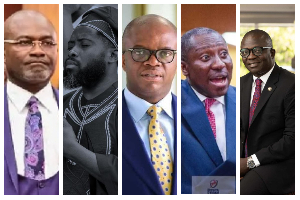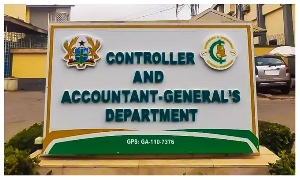Nation building is a complicated project. And like all projects you need to get the Work Breakdown Structure, as project management literature teaches, as detailed and coherent as possible with all the inputs functioning smoothly, constantly reviewing the project in order to produce durable deliverables. In the creation of the Ghana nation-state 50 years ago there have been some problems with the content of the Work Breakdown Structure, making the expected deliverables wobbly, and, in the short-term, undermining Ghana’s progress. One of the missing inputs, over the years, and which Ghanaians elites haven’t thought seriously about, is policy-makers’ and bureaucrats’ non-appropriation of Ghanaian norms, values and traditions in bureaucratization and policy-development.
While these imbalances may be Africa-wide, Ghana, which brand itself as the “Black Star” of Africa, in development terms, as the first sub-Sahara African state to get freedom from British colonial rule in 1957, should have known better, projecting light in this regard. Part of the reason why Ghana/African traditional values have not seen proper daylight in Africa’s development is that either the extremely long-running colonial rule that profoundly suppressed African values for developmental transformation or post-independence African elites’ weak grasp of Africa’s values in its progress, not only has African traditional values not been openly appropriated in policy-making but also certain features of Ghanaians’/Africans’ values deemed unconstructive have not seen conscious attempts to refine them for greater progress.
No doubt, in the Ghanaian/African development scheme of things, the unrefined cultural values, as Ghana’s Upper West Regional Minister, Mr. George Hikah Benson, argues, have “impeded development,” and, in the interim, outweighed the good cultural practices. Still, Ghana’s Upper West Region is instructive because Mr. Benson, and to some extent, a large number of Ghanaian elites, are convinced that the region’s backwardness may be due to certain inhibiting cultural practices. What is happening in Ghana’s Upper West Region, in terms of the relationship between thinking, or the brain, and the development process is that the inhibiting cultural values, ever stronger, appear to outweigh the rational, good parts. But day by day, the good parts of the Ghanaian culture deflected the burly, negative, inhibiting aspects of the culture. So, while the scientific side of the Ghanaian mind demands objective, rational evidence as to why certain cultural inhibitions influence them, their brains’ mythopoeic, irrational side entice them to the inhibiting aspects of the culture - to witchcraft, forced marriage, Malams and Marabouts, the Pull Him Down syndrome, dominance of prophets, evil spirits, juju, or demons, Female Genital Mutilation, ritual killings, etc.
The unbalanced thinking, mired in the inhibiting cultural parts contending with the good parts, sometimes of immense moral complexity, as the development dilemma of Ghana’s northern regions show, thread through the brains of most Ghanaian educated class – after all they were born into the Ghanaian culture and so their Karma start from there. Through such unbalanced developmental turf runs a vibration of what the strong, negative cultural inhibitions could boast of, to quote Caligula, "Remember, I can do anything to anyone.” This is the inhibiting cultural aspects taking on their own power in their vicious freedom. The real struggle may not be between the inhibiting and the good aspects of the Ghanaian culture but rather between comprehending these two contending features of Ghana’s development process so as to resolve them in order to effectively open up the traditional cultural values for progress. Can these matters be addressed with a whole mind, as Ghana’s emerging thinkers, the Ghanaian media and other members of Ghana’s objective society mount campaigns to refine some of the serious inhibitions within the Ghanaian culture? Can the two instincts of the Ghanaian brain, the rational and the irrational, formed by the Ghanaian culture, be made to fit together?
But there are hopes radiating all around to balance Ghanaians’ thinking in their development process – when asked by a Peruvian journalist whether the Ghana U-17 national team, the Black Starlets, used “witchcraft” to beat Peru in South Korea on September 1, 2007, Sellas Tetteh, the Ghanaian coach, responded that it was due to “proper tactics, planning and determination” and not “witchcraft.” Tetteh’s thinking is emerging Ghana-wide. There are emerging thinkers – Mr. Sampson Boafo, Mr. Courage Quashigah, Mr. Bernard Guri and Mr. Kofi Akosah-Sarpong, among others – in the culture-progress template who are intellectually uncomfortable with the current developmental paradigms, working to create awareness and influence policy-making. The media is increasingly covering the culture-progress issue critically. As Mr. Benson illustrates, the elites are increasingly putting the culture-progress issues under developmental searchlight.
The Chieftaincy and Cultural Ministry and other national cultural institutions are coming to terms of the cultural prospects and challenges. Non-governmental organizations tackling cultural tribulations are active nation-wide. Policy-makers, consultants and bureaucrats are gradually waking up to a day when they will appropriate Ghanaian traditional cultural values fully. The Parliament of Ghana is increasingly projecting itself as centre for the distillation of Ghanaian culture, criminalizing such inhibitions like Female Genital Circumcision. Traditional institutions, for long suppressed, are getting respect and dignity, and are being encouraged. And all these show that gradually the development thinking is simultaneously getting comprehensive and being balanced.















